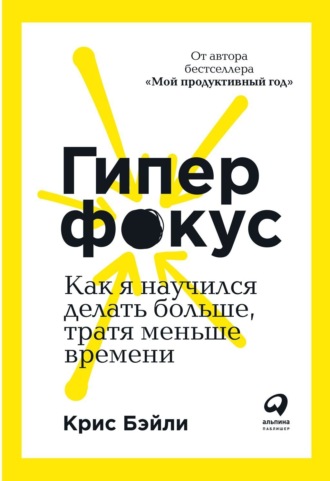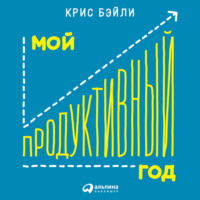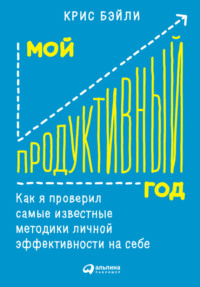
Полная версия
Гиперфокус
Комментарии
1
Gloria Mark et al., “Neurotics Can’t Focus: An in situ Study of Online Multitasking in the Workplace,” in Proceedings of the 2016 CHI Conference on Human Factors in Computing Systems (New York: ACM, 2016), 1739–44, doi:10.1145/2858036.2858202.
2
David Mrazik, “Reconsidering Caffeine: An Awake and Alert New Look at America’s Most Commonly Consumed Drug” (third-year paper, Harvard University, 2004), DASH: Digital Access to Scholarship at Harvard.
3
Wendy Wood, Jeffrey Quinn, and Deborah Kashy, “Habits in Everyday Life: Thought, Emotion, and Action,” Journal of Personality and Social Psychology 83, no. 6 (2002): 1281–97.
4
Timothy Wilson, Strangers to Ourselves: Discovering the Adaptive Unconscious (Cambridge, MA: Belknap Press, 2004).
5
TED, “Mihaly Csikszentmihalyi: Flow, the Secret to Happiness,” YouTube, October 24, 2008, www.youtube.com/watch?v=fXIeFJCqsPs.
6
Nelson Cowan, “The Magical Mystery Four: How Is Working Memory Capacity Limited, and Why?” Current Directions in Psychological Science 19, no. 1 (2010): 51–57; Edward K. Vogel and Steven J. Luck, “The Capacity of Visual Working Memory for Features and Conjunctions,” Nature 390, no. 6657 (1997): 279–81; Nelson Cowan, “The Magical Number 4 in Short-term Memory: A Reconsideration of Mental Storage Capacity,” Behavioral and Brain Sciences 24, no. 1 (2001): 87–114.
7
Giorgio Marchetti, “Attention and Working Memory: Two Basic Mechanisms for Constructing Temporal Experiences,” Frontiers in Psychology 5 (2014): 880.
8
Klaus Oberauer, “Design for a Working Memory,” Psychology of Learning and Motivation 51 (2009): 45–100.
9
Marchetti, “Attention and Working Memory.”
10
Там же.
11
Feng, D’Mello, and Graesser, “Mind Wandering While Reading Easy and Difficult Texts.”
12
Jonathan Smallwood and Jonathan W. Schooler, “The Science of Mind Wandering: Empirically Navigating the Stream of Consciousness,” Annual Review of Psychology 66, no. 1 (2015): 487–518; Matthew A. Killingsworth and Daniel T. Gilbert, “A Wandering Mind Is an Unhappy Mind,” Science 330, no. 6006 (2010): 932.
13
Jonathan Smallwood, Merrill McSpadden, and Jonathan W. Schooler, “When Attention Matters: The Curious Incident of the Wandering Mind,” Memory & Cognition 36, no. 6 (2008): 1144–50.
14
Jennifer C. McVay, Michael J. Kane, and Thomas R. Kwapil, “Tracking the Train of Thought from the Laboratory into Everyday Life: An Experience-Sampling Study of Mind Wandering Across Controlled and Ecological Contexts,” Psychonomic Bulletin & Review 16, no. 5 (2009): 857–63.
15
Adam D. Baddeley, Essentials of Human Memory (Hove, UK: Psychology Press, 1999).
16
Daniel J. Levitin, “Why the Modern World Is Bad for Your Brain,” The Guardian, January 18, 2015.
17
Robert Knight and Marcia Grabowecky, “Prefrontal Cortex, Time, and Consciousness,” Knight Lab, Cognitive Neuroscience Research Lab, 2000.
18
Marchetti, “Attention and Working Memory.”
19
Eyal Ophir et al., “Cognitive Control in Media Multitaskers,” Proceedings of the National Academy of Sciences of the United States of America 106, no. 37 (2009): 15583–87.
20
Mark et al., “Neurotics Can’t Focus.”
21
Sophie Leroy, “Why Is It So Hard to Do My Work? The Challenge of Attention Residue When Switching Between Work Tasks,” Organizational Behavior and Human Decision Processes 109, no. 2 (2009): 168–81.
22
Там же.
23
Mark et al., “Neurotics Can’t Focus.”
24
Killingsworth and Gilbert, “A Wandering Mind Is an Unhappy Mind.”
25
Gordon D. Logan and Matthew J. C. Crump, “The Left Hand Doesn’t Know What the Right Hand Is Doing: The Disruptive Effects of Attention to the Hands in Skilled Typewriting,” Psychological Science 20, no. 10 (2009): 1296–300; Sian L. Beilock et al., “When Paying Attention Becomes Counterproductive: Impact of Divided Versus Skill-Focused Attention on Novice and Experienced Performance of Sensorimotor Skills,” Journal of Experimental Psychology: Applied 8, no. 1 (2002): 6–16.
26
Feng, D’Mello, and Graesser, “Mind Wandering While Reading Easy and Difficult Texts.”
27
Jonathan W. Schooler et al., “Meta-awareness, Perceptual Decoupling and the Wandering Mind,” Trends in Cognitive Sciences 15, no. 7 (2011): 319–26.
28
Wendy Hasenkamp et al., “Mind Wandering and Attention During Focused Meditation: A Fine-Grained Temporal Analysis of Fluctuating Cognitive States,” Neuroimage 59, no. 1 (2012): 750–60.
29
Killingsworth and Gilbert, “A Wandering Mind Is an Unhappy Mind.”
30
Gloria Mark, Victor Gonzalez, and Justin Harris, “No Task Left Behind? Examining the Nature of Fragmented Work,” in Proceedings of the SIGCHI Conference on Human Factors in Computing Systems (New York: ACM, 2005), 321–30, doi:10.1145/1054972.1055017.




